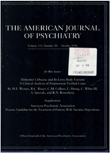Histories of childhood trauma in adult hypochondriacal patients
Abstract
OBJECTIVE: This study examined the childhood histories of trauma, parental attitudes toward health, and physical illness in hypochondriacal adults. METHOD: Sixty outpatients with DSM-III-R hypochondriasis and 60 nonhypochondriacal outpatients from the same general medical clinic were compared. All patients completed the Childhood Traumatic Events Scale and an eight-item questionnaire about childhood illness and health. Medical morbidity was assessed with a medical record audit. RESULTS: Significantly more hypochondriacal than nonhypochondriacal patients reported traumatic sexual contact (28.6% versus 7.3%), physical violence (32.1% versus 7.3%), and major parental upheaval (28.6% versus 9.1%) before the age of 17. These differences remained statistically significant after sociodemographic differences between the groups were controlled for with multivariate regression analysis. The two groups did not differ in the age at which these traumas occurred or in the degree of trauma experienced. Significantly more hypochondriacal patients reported being sick as children and missing school for health reasons, but they did not differ in other measures of childhood illness and parental attitudes toward illness. The two groups had similar levels of aggregate medical morbidity. CONCLUSIONS: Hypochondriacal adults recall more childhood trauma than do nonhypochondriacal patients, even after sociodemographic differences are controlled for. They also recall more childhood illness, although they are not currently more medically sick.
Access content
To read the fulltext, please use one of the options below to sign in or purchase access.- Personal login
- Institutional Login
- Sign in via OpenAthens
- Register for access
-
Please login/register if you wish to pair your device and check access availability.
Not a subscriber?
PsychiatryOnline subscription options offer access to the DSM-5 library, books, journals, CME, and patient resources. This all-in-one virtual library provides psychiatrists and mental health professionals with key resources for diagnosis, treatment, research, and professional development.
Need more help? PsychiatryOnline Customer Service may be reached by emailing [email protected] or by calling 800-368-5777 (in the U.S.) or 703-907-7322 (outside the U.S.).



